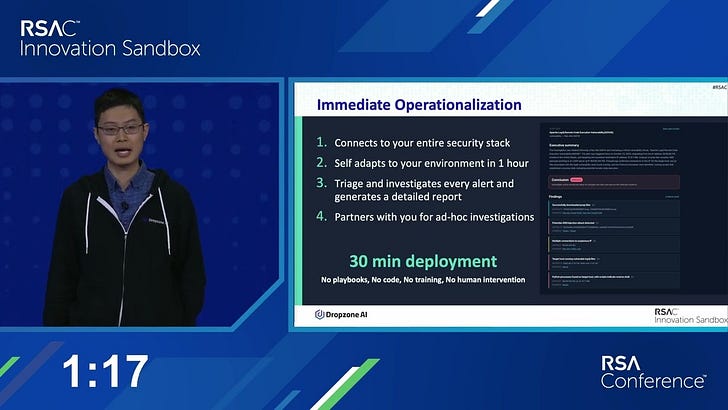AI Agents: Microsoft raise the bar for all operations, not just security
Automation has long been the dream for cyber ops. With AI Security Engineers in the spotlight, Microsoft shows it’s time to think beyond security.
Hello Cyber Builders! 🖖
With US election week underway, let’s turn our attention to the future of AI agents and how they’re set to revolutionize cybersecurity work. After watching the latest keynote from Microsoft’s CEO, I’m struck by a bold comparison: Microsoft’s new AI platform might be as transformative for business as Excel was in its day.
Remember, Excel launched back in the 1980s. It’s arguably the original “no-code” platform, empowering millions who wouldn’t call themselves “coders” to create powerful tools for their work. The average “Excel developer” isn’t the stereotypical engineer but your everyday office colleague, building custom spreadsheets to streamline tasks.
In his latest AI Tour London keynote, Satya Nadella compared this legacy to the new Copilot Studio. Imagine a world where anyone in the office can build an AI agent, pulling from vast amounts of company data—structured, unstructured, or anything from the MS Office ecosystem—to create an agent capable of handling multi-step processes.
Boost productivity, cut costs, and accelerate work.
AI Agents as Office Helpers for Everyone
Nadella’s vision is powerful. He’s predicting a workplace where AI agents work like personal assistants, interns, or contractors, running alongside every white-collar worker. Each person could soon have their own “digital team” of agents to handle routine and complex tasks, driving a monumental shift in productivity.
I shared thoughts on the AI agent concept back in June (link at the end!), but here’s a recap of some key capabilities these agents bring to the table:
Role Play / Focus: System prompts to keep the agent on task.
Tool Usage: Connecting to data sources or systems to pull data or send commands.
Self-Reflection: The ability to review logs and make adjustments autonomously.
Specialized Collaboration: Using system prompts to create specialized agents for specific tasks.
Planning: Enabling agents to follow strategic steps aligned with your goals.
Memory: Retaining context for ongoing or repeated tasks.
Human Interaction: Requesting guidance as needed.
But here’s a key point: while these agents can take over many tasks, they’re not yet on the cusp of reasoning like humans. Valid “reasoning” remains an ambition for future foundational AI models. Right now, it’s all about maximizing existing capacities for task automation.
Cyber Builders must broaden their views.
For those of us in cybersecurity, this isn’t something we can afford to ignore.
The AI revolution isn’t happening solely in our industry. We must broaden our view beyond AI-specific cyber solutions (like AI-enhanced SOCs or SOAR platforms) and tune in to the larger shifts across the tech landscape.
What’s happening with AI agents in other sectors is bound to ripple into ours.
Are we ready to build AI agents that work with us, not just around us?
Thoughts?
Laurent 💚
June post on AI Agents:
AI Assistant & AI Agents - Part 2
AI Agents are a step beyond traditional AI Assistants. While AI Assistants, like Siri or ChatGPT, respond to direct commands and queries, AI Agents are designed to act autonomously based on pre-set goals.




Simbian (https://simbian.ai) is 100% focused on building AI cybersecurity agents. There are a few other competitors newly entered to this market as well (though they are behind us)
Anyone who is thinking "chatbot" when it comes to AI in cybersecurity is not paying attention.
Thanks Freddy.
I'd love to learn more and maybe do an interview. I am sending a private message